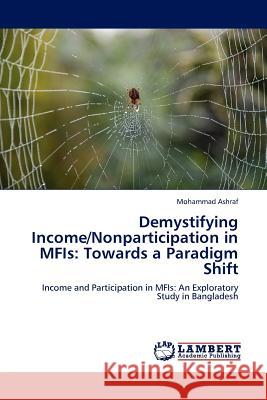Demystifying Income/Nonparticipation in MFIs: Towards a Paradigm Shift » książka
Demystifying Income/Nonparticipation in MFIs: Towards a Paradigm Shift
ISBN-13: 9783845417684 / Angielski / Miękka / 2011 / 168 str.
The main objectives of this book are three-fold. Firstly, we surveyed the participants in the GB, BRAC and ASA in order to see the income status of the rural in Bangladesh which shows that income of the participants of these MFIs have not been increased. So the outcomes of the studies which showed earlier that the income of the participants of the MFIs had been increased that helped the rural poor to break the poverty circle in Bangladesh are evidently misleading. This study also makes a humble attempt to identify the factors that are prohibiting the rural poor in becoming the participants in the MFIs in Bangladesh. The result shows that there have been at least seven reasons and two of them are religious factors which are responsible for discouraging the rural poor to become the participants in the MFIs. This fact implies that we need an alternative way which can involve those rural poor who remain outside microfinance scheme can try to improve their own economic condition by self-employment in the micro-enterprises operated by themselves. In this respect, we explored the potentialities of three Islamic MFIs (IMFIs) operated in Bangladesh and recommended a paradigm shift.
The main objectives of this book are three-fold. Firstly, we surveyed the participants in the GB, BRAC and ASA in order to see the income status of the rural in Bangladesh which shows that income of the participants of these MFIs have not been increased. So the outcomes of the studies which showed earlier that the income of the participants of the MFIs had been increased that helped the rural poor to break the poverty circle in Bangladesh are evidently misleading. This study also makes a humble attempt to identify the factors that are prohibiting the rural poor in becoming the participants in the MFIs in Bangladesh. The result shows that there have been at least seven reasons and two of them are religious factors which are responsible for discouraging the rural poor to become the participants in the MFIs. This fact implies that we need an alternative way which can involve those rural poor who remain outside microfinance scheme can try to improve their own economic condition by self-employment in the micro-enterprises operated by themselves. In this respect, we explored the potentialities of three Islamic MFIs (IMFIs) operated in Bangladesh and recommended a paradigm shift.











